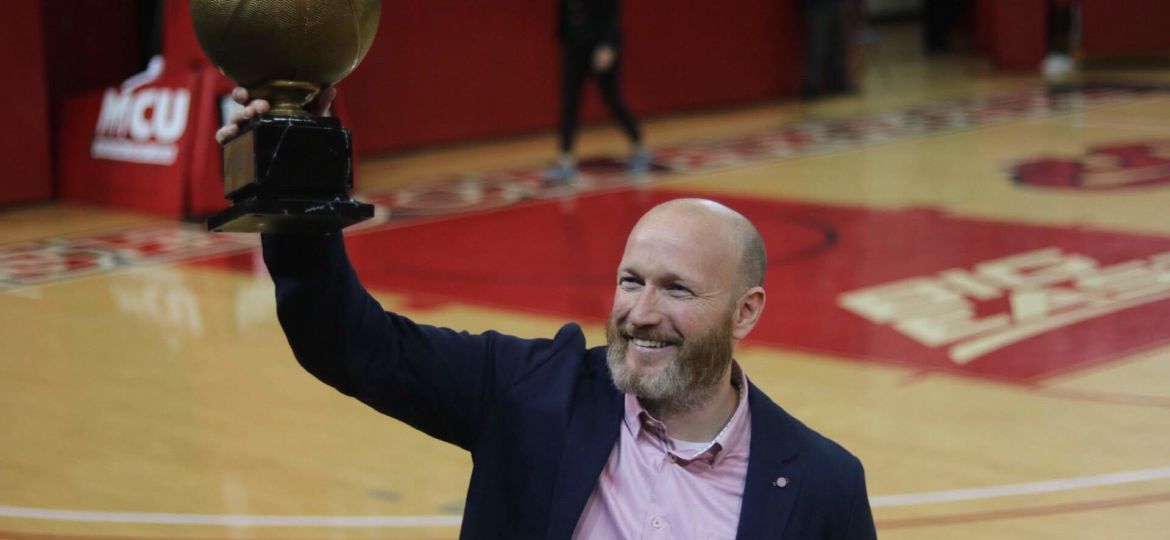
Written By: Sam Oshtry
It’s been more than 20 years, but Marc Skelton remembers living on a kibbutz in Israel following his college graduation with a basketball court nearby. It had been a few years since Skelton had played competitively, but he shot around and played pickup on the local court.
One day on the kibbutz, Skelton was approached by a man who had been watching Skelton play for some time and was so impressed he asked him to try out for his brother’s professional basketball team in Haifa, Israel. The only problem? Skelton’s flight back to America was the next day.
He never went to the tryout, and instead of a professional opportunity, was left wondering what could have been. But this summer, over 20 years later, Skelton’s basketball journey will come full circle in the 45+ Masters division at the 21st Maccabiah.
“There was this moment like, I could’ve played, I could’ve played, in Israel or in college, but why not give it a shot now,” Skelton said.
That shot will come when Skelton represents the U.S. as a basketball player competing against athletes from all over the world in what many call the “Jewish Olympics.”
Skelton wears a plethora of hats in his life – coach, author, teacher, father, husband, and now player. As he’s navigated various roles and responsibilities, basketball has remained part of his life.
Skelton grew up in New Hampshire and immediately gravitated towards the sport as a kid. How could he not, growing up in Celtics territory in the 1980s, during the height of the Boston dynasty? His love for playing grew as he got older, and his hard work paid off.
“It’s really all I did, I was just a hoop junkie,” Skelton said.
Skelton made the varsity team as a freshman in high school – the only 9th grader selected – and went on to become a decorated high school player. While basketball had dominated his life, Skelton went on to pursue other interests at Northeastern University. Following his graduation and time on a kibbutz, Skelton joined the Peace Corps.
Eventually, Skelton moved to New York with his wife and pursued teaching. That led him to Fannie Lou Hamer High School in the Bronx, where he became a teacher in the 2000s. Skelton’s focus was on education, not basketball. But his classroom was a few doors down from the gym, so he poked his head in every now and then. Skelton volunteered as an assistant coach for a couple years before he officially became the head coach in 2007.
“Once I started coaching, I felt like I really wanted to be a good coach,” Skelton said.
And the program was in dire need. 0-18. That was the record of the team Skelton took over in 2007.
Skelton adopted the tone of New York City basketball and its physical style of play into his coaching philosophy. However, it’s impossible to know it from talking to Skelton away from the court. He has a calm, even keeled demeanor, but a New York times profile that chronicled a season with Skelton on the sidelines painted him as a hard, no-nonsense coach who enjoys the occasional expletive-filled rant but ultimately wants the best for his players as students and men.
As for the winless program he took over, Skelton’s turned it into multiple league championships and a state championship that has Fannie Lou Hamer considered one of the powerhouses in New York City basketball.
The resilient, hard-nosed flair that made him one of the premier coaches in New York City was put to the test when Skelton decided to give his playing days another try.
“I like the idea that I coach how I used to play and now I’m playing how I coach,” Skelton said.
However, the journey to the tryout was far from easy.
When Skelton’s oldest daughter was born in 2009, he stopped playing competitively. But last April, Skelton was on social media when he saw a posting for a tryout for the 21st Maccabiah 45+ Masters.
“I saw this thing called 45 plus masters and I started laughing,” Skelton said. “Like what is this, this can’t be true.”
By his own admission, somewhat due to the pandemic, Skelton looked like the loaf of challah his family ate every Friday night at Shabbat dinner. That changed when Skelton implemented a rigorous workout plan to get himself back into shape in just a few months.
In the spring and summer of 2021, Skelton practiced at nearby courts on his dribbling and shooting, but it took a while to revive his rhythm.
“I was away from the game for a while, and someone stole my shot,” Skelton said. “It took me a while to rediscover where it was.”
Through the training, Skelton’s injuries started to pile up, but he had a goal: earn a spot and a trip to Israel. And nothing was going to come in the way of that.
“After every workout, the knees would flare up, my back would stiffen up, calf injury, you name it… it was a true struggle physically,” Skelton said. “But the mental part I didn’t have a problem with because I was going to try out and be ready by October.”
Skelton could’ve called it quits and not gone through with his plan. But he wanted to prove to himself he could still play after turning down a chance more than 20 years earlier on that kibbutz in Israel.
“It’s this great life circle,” Skelton said. “It’s this story of rejuvenation, this story of getting back on the court, but also having it be in Israel is even more special.”
By October, he was ready. But the preparation alone wasn’t going to earn him a spot. The impression he left in Philadelphia was the ultimate factor.
Coach how you play, and play how you coach. That’s what Skelton remembered. His coaching philosophy is built on a toughness that prioritizes defense and hustle. So that’s how he played. When scrimmages began, Skelton picked up full court, getting into his opponents face with a gritty style.
“Whoever was bringing the ball up the court, I tried to make his life very difficult … That’s the New York City mentality,” Skelton said. “I want to be the Jewish Marcus Smart.”
Skelton’s tenacity made an impression on the coaching staff and a few weeks later he got the call he was headed to Israel.
“Because of the work I put in and the sacrifice… I was definitely very excited,” Skelton said.
It’s been an adjustment for Skelton to get back to the player mentality as he prepares to leave for Israel in July. But he’s prepared to do anything that’s necessary to help his team win and walk away with a gold medal around his neck.
“When I talk to the different guys on the team, it’s gold, gold, gold,” Skelton said. “We’re not going over there to just show up.”
Skelton’s journey may have been different if he decided to take that tryout in Haifa or pursue playing in college. But now, more than 20 years later, he doesnt think about it much. All he knows is he’s going to take advantage of an opportunity of a lifetime.
“This is it,” Skelton said when asked if there was anything else that could have motivated him to pick up the orange ball again. “It’s because of the Maccabiah that I worked out, got back in shape and made the team.”
